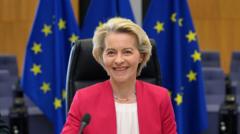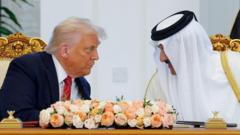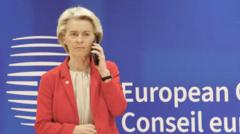A landmark ruling by the E.U.'s General Court emphasizes the importance of transparency in public health decision-making, particularly regarding the procurement of Covid-19 vaccines.
Court Ruling Bolsters Transparency for E.U. Vaccine Negotiations

Court Ruling Bolsters Transparency for E.U. Vaccine Negotiations
The European Union has been ordered to disclose text messages related to Covid-19 vaccine negotiations between Ursula von der Leyen and Pfizer's CEO.
In a groundbreaking decision that may pave the way for enhanced transparency within the European Union, the General Court in Luxembourg ruled in favor of The New York Times, compelling the European Commission to release previously withheld text messages exchanged between Ursula von der Leyen, the Commission's president, and Albert Bourla, CEO of Pfizer. This ruling emerged from a 2023 case where the Commission declined to disclose texts related to the negotiations of Covid-19 vaccine contracts, arguing they were brief and unimportant.
The crux of the legal battle centered on whether text messages should be classified as public records under EU law, warranting disclosure to the public. The court countered the Commission’s stance, ruling that the authority cannot claim non-existence of requested documents without providing adequate justification. The judges criticized the Commission for failing to convincingly articulate why the text exchanges did not hold significant public interest or information.
According to the court’s findings, transparency in the procedures related to the procurement of vaccines is paramount, especially when such decisions impact public health. The court's comments underline that the E.U. must take its accountability to citizens seriously, stating, "The commission has not given plausible reasons for its conclusion regarding the importance of these exchanges."
This ruling is expected to have significant implications as it establishes a precedent for greater scrutiny regarding governmental dealings and can potentially enhance public trust in the E.U.’s decision-making processes in future health crises.





















